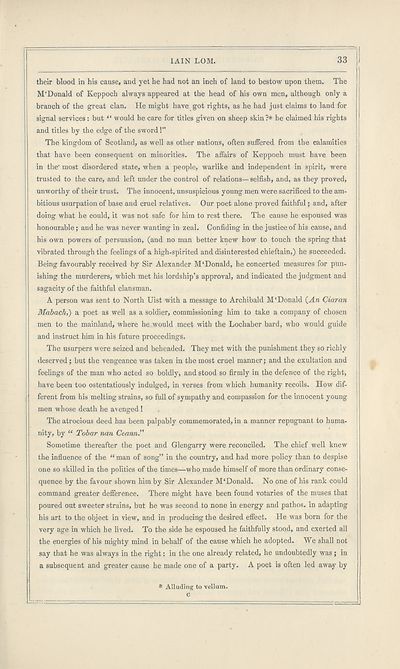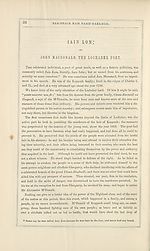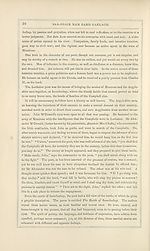Books and other items printed in Gaelic from 1871 to 1900 > Sar-obair nam bard gaelach, or, The beauties of Gaelic poetry, and lives of the Highland bards
(113) Page 33
Download files
Complete book:
Individual page:
Thumbnail gallery: Grid view | List view

IAIN LOM.
33
their blood in his cause, and yet he had not an inch of land to bestow upon them. The
M'Donald of Keppoch always appeared at the head of his own men, although only a
branch of the great clan. He might have got rights, as he had just claims to land for
signal services: but “ would he care for titles given on sheep skin?* he claimed his rights
and titles by the edge of the sword!”
The kingdom of Scotland, as well as other nations, often suffered from the calamities
that have been consequent on minorities. The affairs of Keppoch must have been
in the’ most disordered state, when a people, warlike and independent in spirit, were
trusted to the care, and left under the control of relations— selfish, and, as they proved,
unworthy of their trust. The innocent, unsuspicious young men were sacrificed to the am¬
bitious usurpation of base and cruel relatives. Our poet alone proved faithful; and, after
doing what he could, it was not safe for him to rest there. The cause he espoused was
honourable; and he was never wanting in zeal. Confiding in the justice of his cause, and
his own powers of persuasion, (and no man better knew how to touch the spring that
vibrated through the feelings of a high-spirited and disinterested chieftain,) he succeeded.
Being favourably received by Sir Alexander M'Donald, he concerted measures for pun¬
ishing the murderers, which met his lordship’s approval, and indicated the judgment and
sagacity of the faithful clansman.
A person was sent to North Uist with a message to Archibald M'Donald (An Ciaran
Mabach,) a poet as well as a soldier, commissioning him to take a company of chosen
men to the mainland, where he would meet with the Lochaber bard, who would guide
and instruct him in his future proceedings.
The usurpers were seized and beheaded. They met with the punishment they so richly
deserved ; but the vengeance was taken in the most cruel manner; and the exultation and
feelings of the man who acted so boldly, and stood so firmly in the defence of the right,
have been too ostentatiously indulged, in verses from which humanity recoils. How dif¬
ferent from his melting strains, so full of sympathy and compassion for the innocent young
men whose death he avenged!
The atrocious deed has been palpably commemorated, in a manner repugnant to huma¬
nity, by “ Tobar nan Ceann.”
Sometime thereafter the poet and Glengarry were reconciled. The chief well knew
the influence of the “ man of song” in the country, and had more policy than to despise
one so skilled in the politics of the times—who made himself of more than ordinary conse¬
quence by the favour shown him by Sir Alexander M'Donald. No one of his rank could
command greater defference. There might have been found votaries of the muses that
poured out sweeter strains, but he was second to none in energy and pathos, in adapting
his art to the object in view, and in producing the desired effect. He was born for the
very age in which he lived. To the side he espoused he faithfully stood, and exerted all
the energies of his mighty mind in behalf of the cause which he adopted. We shall not
say that he was always in the right: in the one already related, he undoubtedly was; in
a subsequent and greater cause he made one of a party. A poet is often led away by
* Alluding to vellum.
C
J
33
their blood in his cause, and yet he had not an inch of land to bestow upon them. The
M'Donald of Keppoch always appeared at the head of his own men, although only a
branch of the great clan. He might have got rights, as he had just claims to land for
signal services: but “ would he care for titles given on sheep skin?* he claimed his rights
and titles by the edge of the sword!”
The kingdom of Scotland, as well as other nations, often suffered from the calamities
that have been consequent on minorities. The affairs of Keppoch must have been
in the’ most disordered state, when a people, warlike and independent in spirit, were
trusted to the care, and left under the control of relations— selfish, and, as they proved,
unworthy of their trust. The innocent, unsuspicious young men were sacrificed to the am¬
bitious usurpation of base and cruel relatives. Our poet alone proved faithful; and, after
doing what he could, it was not safe for him to rest there. The cause he espoused was
honourable; and he was never wanting in zeal. Confiding in the justice of his cause, and
his own powers of persuasion, (and no man better knew how to touch the spring that
vibrated through the feelings of a high-spirited and disinterested chieftain,) he succeeded.
Being favourably received by Sir Alexander M'Donald, he concerted measures for pun¬
ishing the murderers, which met his lordship’s approval, and indicated the judgment and
sagacity of the faithful clansman.
A person was sent to North Uist with a message to Archibald M'Donald (An Ciaran
Mabach,) a poet as well as a soldier, commissioning him to take a company of chosen
men to the mainland, where he would meet with the Lochaber bard, who would guide
and instruct him in his future proceedings.
The usurpers were seized and beheaded. They met with the punishment they so richly
deserved ; but the vengeance was taken in the most cruel manner; and the exultation and
feelings of the man who acted so boldly, and stood so firmly in the defence of the right,
have been too ostentatiously indulged, in verses from which humanity recoils. How dif¬
ferent from his melting strains, so full of sympathy and compassion for the innocent young
men whose death he avenged!
The atrocious deed has been palpably commemorated, in a manner repugnant to huma¬
nity, by “ Tobar nan Ceann.”
Sometime thereafter the poet and Glengarry were reconciled. The chief well knew
the influence of the “ man of song” in the country, and had more policy than to despise
one so skilled in the politics of the times—who made himself of more than ordinary conse¬
quence by the favour shown him by Sir Alexander M'Donald. No one of his rank could
command greater defference. There might have been found votaries of the muses that
poured out sweeter strains, but he was second to none in energy and pathos, in adapting
his art to the object in view, and in producing the desired effect. He was born for the
very age in which he lived. To the side he espoused he faithfully stood, and exerted all
the energies of his mighty mind in behalf of the cause which he adopted. We shall not
say that he was always in the right: in the one already related, he undoubtedly was; in
a subsequent and greater cause he made one of a party. A poet is often led away by
* Alluding to vellum.
C
J
Set display mode to:
![]() Universal Viewer |
Universal Viewer | ![]() Mirador |
Large image | Transcription
Mirador |
Large image | Transcription
Images and transcriptions on this page, including medium image downloads, may be used under the Creative Commons Attribution 4.0 International Licence unless otherwise stated. ![]()
| Permanent URL | https://digital.nls.uk/107580002 |
|---|
| Description | Out-of-copyright books printed in Gaelic between 1631 and 1900. Also some pamphlets and chapbooks. Includes poetry and songs, religious books such as catechisms and hymns, and different editions of the Bible and the Psalms. Also includes the second book ever published in Gaelic in 1631. |
|---|

